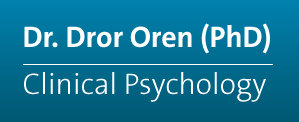Psychological treatment (Psychotherapy)
At the formal definition level, psychological treatment is a healing process that takes place between two (or more) people, the therapist and the client/s. The Psychologists' Law in Israel defined in 1979 who is a psychologist and which treatment he or she is authorized to provide within one's specialty. In order for a person to be defined as a psychologist, they must first possess a graduate degree (M.A.) in psychology from a university in Israel, or a recognized university in the world, and then go through a process of registration in the National Registry of Psychologists. To find out whether a person is truly a psychologist, you must refer to the Registry of Psychologists listed on the site of the Ministry of Health, and by typing in the person's name, determine whether he or she is listed as a psychologist. As of today, psychological treatment is given by a specialist clinical psychologist. This means a psychologist who, after being recognized by the Ministry of Health, worked in a clinical internship setting, under supervision in therapy and diagnosis, in a recognized place, for at least four years. Later on, they passed an examination by a group of senior psychologists from another district, while for this examination they had written a paper and later successfully passed an oral examination in the areas of psychological treatment and diagnosis. At the end of the process, the Ministry of Health issues the person an official certificate of an Specialist Psychologist (See Psychologists' Law). If you are interested that your therapist will be a psychologist, pay attention to the certificate in their office, or to the listing in the Ministry of Health's Register of Psychologists, to see that there is proof of their formal education and qualification.
On the practical level, (individual) psychological treatment is a process of conversation between two people, aimed at improving the emotional state of the person who has sought the service, i.e.. the client. Will the goal be to improve, alleviate suffering, get well, or another focus? This definition depends on the encounter between the client's needs on the one hand and the therapist's theoretical attitudes on the other hand. If you decide to be a client, you will determine what you would like to change, what your goal is (to be more relaxed, less guilty, suffer less from depression, or any other pattern you would like to change).However, the therapist's attitudes towards life in general and towards the goal of the psychological treatment process, determine quite a lot. A psychologist, who believes that the purpose in life is to reduce suffering or adjust, will work differently from a psychologist who believes that a person should produce meaningful goals for their life.
Psychological treatment is based on the developmental work; the fact that we were born into, grew in and developed from a relationship, and that is why when we wish to improve our existential being, a relationship can do this. A relationship where an alliance is formed, where there is hard work, investment and focusing on the attempt to achieve change.
A process of psychological treatment can deal with the amelioration of a symptom, for instance, a person worries before a new job and comes to get aid/receive support/strengthen towards the change. This is a focused treatment, and often treatments (dynamic, cognitive, behavioral) will deal with reduction of suffering or amelioration of a given problem with which a person is trying to cope.
Many people come for psychological treatment not necessarily out of momentary/focused/specific distress. They come for treatment because they are unhappy, because they feel aimless, that they are not actualizing their lives or have a general feeling of being stuck. People sometimes do not know exactly how to define what troubles them. It is possible that from society's point of view that person seems to be functioning, successful, prosperous, as if "on the right track", but this external image does not match the internal feeling. Nowadays, people in such a state turn more and more to therapy, that is actually a 'life journey'. They come to try to discover, out of active conversation: what is troubling, what is blocking, what they would want. They come to find a purpose, a mission, a direction in their lives.
Emotional therapy is sometimes mistakenly perceived as an experience of enjoyment and fun, a sort of encounter where someone listens and a process of ventilation is performed. In practice, emotional therapy is essentially different from a one-person conversation. It is about an attempt to look at, see, feel and understand the meaningful things in life the emotional life, the fears, the meaning of things. Such a process evokes emotional pain, turmoil, suffering, which are part of the healing process.
If one looks for a defined/categorical point of reference for the approach that characterizes my work, I would mention the following among the theoreticians, clinicians and authors who have consciously influenced me: Adler, Erikson, Fromm, Camus, Casement, Yalom, Mitchel, and more. My therapeutic approach can be defined as dynamic and existential, although according to my view, all the theories are taken to be amalgamating tools/conceptions/explanations, which help in the attempt to understand the person, achieve a meaningful encounter with them, and help with their development; these are the means, while it is all about the person being treated.


